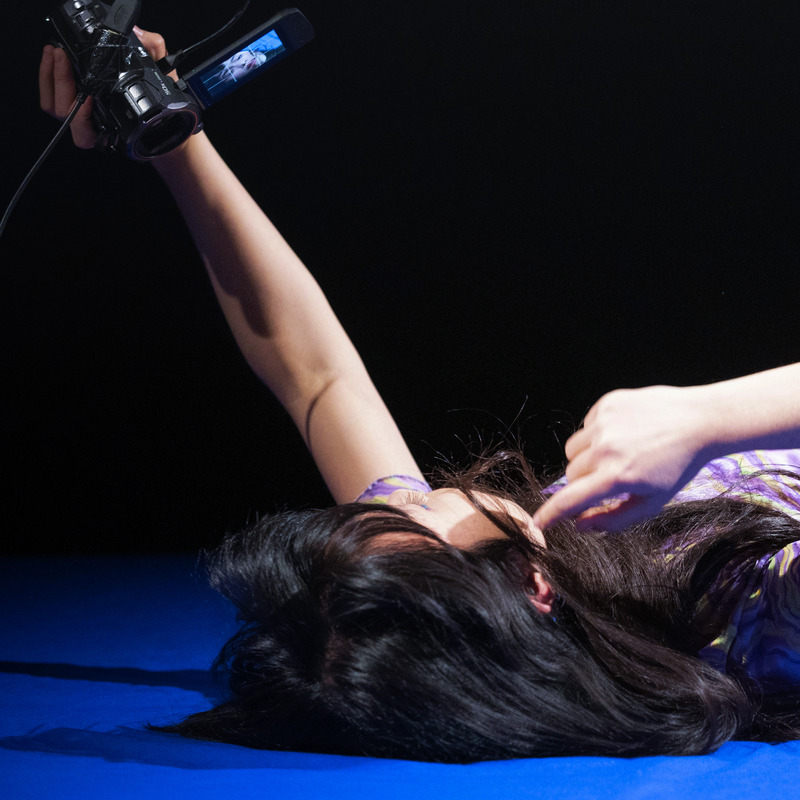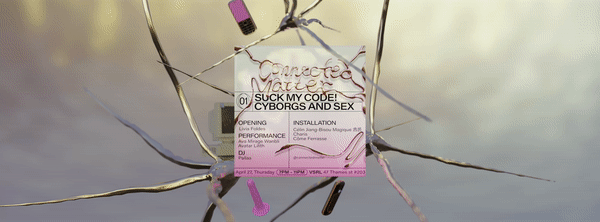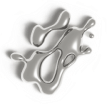Edition 01: SUCK MY CODE! CYBORGS & SEX


Art event hosted on April 27th, 2023 at VSRL in Bushwick, NYC featuring Ava Wanbli, Adrienne Cassel aka Avatar Lilith, Livia Foldes, Célin Jiang aka Bisou Magique, Charis, and Ulysse Lazar aka Cozm.
“The glitch challenges us to consider how we can “penetrate … break … puncture … tear” the material of the institution, and, by extension, the institution of the body. Thus, hacking the “code” of gender, making binaries blurry, becomes our core objective, a revolutionary catalyst. Glitched bodies—those that do not align with the canon of white cisgender heteronormativity—pose a threat to social order. Range-full and vast, they cannot be programmed.”
- Excerpt From Glitch Feminism, Legacy Russell, 2020
connectedmatter is pleased to present its debut exhibition, SUCK MY CODE! CYBORGS & SEX, the first edition of a continual performance series dedicated to the exploration of art, technology, gender, race, and sustainability. Featuring one workshop animated by Livia Foldes, two performances by Avatar Lilith and Ava Mirage Wanbli, and a media installation composed of three videos by Célin Jiang, Ulysse Lazar, and Charis, this edition attends to explore the intricacies between gender, sexuality, and technology.
Inspired by the famous VNS Matrix Bitch Mutant Manifesto (1996), SUCK MY CODE! is an ode to those who work to dismantle systems of patriarchy and oppression within cyberspaces. In light of the double objective of cyberfeminism, which intends to rewrite a history of new technologies from the perspectives of (white) women, excluding queer/bipoc from the dialogue, how can we gather and organize to craft alternative realitie(s)? Can we critically engage with the notion of a cyborg? How can we be more integrative with a larger audience when it comes to art and technology? How can we avoid gatekeeping our work to an insular community of academia that has little ties to our lived experiences and realitie(s)?
In a world where technology is often fetishized as a mysterious black box, depriving us of our capacity to think through the morphological and sociological changes that have been induced by its presence in our daily hood, this exhibition aims to instill a conversation through the collectivist potential of art, while distancing itself from oppressive standpoints. Designed as a glitch, a resistance to the imposed binarity of our futures, it intends to create a joyful yet subversive space. Willing to provoke thought, and address issues often excluded from the mainstream narrative, it attempts to fantasize and organize our collective futures.
Referring to Gretchen Bender’s (1951 -2004) multimedia installation Total Recall (1987) whose work was invisibilized for decades only to be considered after her death, the CRT TVs installation present in the exhibition speaks to the alienation and hyper-realism of (social) media nowadays. Shifting from a bulky TV to a smartphone, videos looping at all times mimic Instagram's algorithms trapping us in mesmerizing feeds in a growing logic of consumption and self-awareness.
In parallel with the event, we distributed twenty USBs containing academic readings, artworks, audio tracks, and an open letter by Ava Wanbli regarding the violence she went through at the University of Chicago. Access to education and cultural resources is a privilege. Sharing the theoretical framework that accompanied the creation of this event is a practice desired as proof of transparency and equity.
About the Opening

Livia Foldes (she/her) works in the latent space between art, design, technology, and activism to interrogate and reimagine technologies of intimacy and control. Her work asks how and why machines are taught to understand and misunderstand our bodies and the identities they carry and explores the radical potential simmering in the gaps. She writes, holds workshops and events, makes software and websites, and uses emerging tools to make images. As the co-founder and creative director of Decoding Stigma, a collective calling for the inclusion of sex worker voices in all spaces that purport to be designing our future, she brings grassroots research and radical theory to accessible platforms through playful, subversive imagery.
She teaches about AI and extended reality at the Rhode Island School of Design, and holds an MFA in Design and Technology from Parsons. She is currently a resident in the Future Memory track of NEW INC, the New Museum’s art and tech incubator.
About the Performances
Sertraline Dolls, Ava Mirage Wanbli, 2023
![]()
“Sertraline Dolls (Performance, 2023) is a mechanism for the performer to crash together multiple temporalities of self and the development of her trans body through modes of reconnection and deconstruction of past and future desires. In her performance, the primary conversation is a lot around how we consume bodies, most specifically how we may fetishize and objectify trans women's bodies through media, displays of sex, and her histories. The primary aspect of the performance is that she resurrected her old "boy" body that desperately wanted to sleep with a transwoman, so she gave that to him. He never would have expected the transwoman to be her”.
Ava Mirage Wanbli (she/her) is a New Media Performance Artist based in Chicago. She considers herself a world builder through virtual spaces but also in queer/trans nightlife, and DIY art spaces, and operates also as a community organizer to uplift and give platforms for trans liberation. Wanbli received her Masters's Degree in Fine Arts at the School of the Art Institute of Chicago in 2019. Alongside her art practice and community engagement, she has been an educator at multiple art institutions for the last 4 years. She is a recipient of 3Arts New Wave Artists Award and has been a resident of ACRE Artist residency as well as New Art City Residency. Her most current work has been shown at Roots and Culture Contemporary Art Gallery in Chicago and is now being shown in a 6-month solo exhibition at the Madison Museum of Contemporary Art. Wanbli has also been published in Tone Magazine as well as curated events at Mana Contemporary in Chicago, specifically a panel discussion around sex work within art and the academy. She speaks about aspects of voyeurism, fetishization, and consumption of the body through digital personas and engagement.
Open Source by Avatar Lilith (2023)
Open Source (Performance, 2023) expands the idea of boundaries and membranes as it relates to algorithms and technology. The Black Box is an engineering and computer science term that describes a device or system which produces output (data) without revealing any information about its internal mechanism. This presents an asymmetry of power between developers, technology, corporations, and “users.” With AI becoming more present in our cultural exchanges, how can we exist in a future that holds truth and veritability as a pillar of society? How can we be true to ourselves and each other? By giving the Black Box flesh and blood, Open Source attempts to reimagine the boundaries and membranes between both bodies that generate internal and external motion (Avatar Lilith and the Black Box). Where does one end and the other begin?

Adrienne Cassel, also known as Avatar Lilith, is an artist, creative technologist, and designer based in NYC. They are currently pursuing their MFA in Design and Technology at Parsons School of Design at The New School. Masquerading as an avatar, they use voice, sound design, motion capture, & cgi to seek to indoctrinate all who listen into rejecting linearity and binary logic systems as a speculative and critical practice. Their work has been exhibited at ACUD GALERIE, Laboratory Art Residency, The Stonewall Inn, The Fuse Factory, The Miller Gallery, The Frame, Ars Electronica, Fact Magazine, Future Tenant Gallery, and PS1 Iowa City. Avatar Lilith is just as real as you.
About the Installation:
NIVEA, L’ÉTERNITÉ N’EXISTE PAS (NIVEA, ETERNITY DOES NOT EXIST) (2021)

Sound composition and performance broadcast in live streaming, multimedia creation, 3’00, activated during the Liebe und Zuneigung Festival, Künstlerhaus BBK, Europäische Kulturtage 2021, Jubez, Karlsruhe (DE).
The study of technological developments in tools and video devices has highlighted the way in which interactivity social networks and the implementation of Live Streaming have favored the performativity of online affects.
Thus, the implementation of Live Streaming within social network platforms drastically transforms how we interact with each other, and how we perceive the human body.
The perfect simulation of our humanity is scattered, viral, and co-created. As our attention is quantified, and viewed, we desire in a non-haptic world of screens. Possibilities of physical contact slowly fade away, while simultaneously offering new ways to be touched. The fluctuation of the emotional palette is wide and paradoxical, confronting us with multiple interpretations of desire and the production of its image.
The digital space of the social web appears as an accessible territory, which we strive to conquer and design according to prefabricated fantasies where affective and emotional capitalism seems limitless. It's about a kind of perpetual spectacle mixed with “real” life. Virtual spaces and activities then infiltrate our intimacy in such a way that we can no longer dissociate them from an algorithmic staging of an experience of the hyper-real: our behaviors make them all real.
Célin Jiang (she/her), also known as Bisou Magique, is a transdisciplinary PhD artist-researcher based between Paris and Shanghai. Her multidimensional practice aims to explore the relationships between the arts, technologies, and the digital humanities. The decolonial approach to the cross-cultural aesthetic of her work is rooted in cultural studies. By questioning our perception of identities in a globalized context, Célin Jiang considers collaborative work as a vector of change: what can be the potential of the social function of art? By forming a fertile ground for emancipation and experimentation, artificial intelligence and spirituality intersect to nourish visions of interconnections and post-humanist mutations. Her works have been exhibited at Ars Electronica Festival 2020 (Linz, AT), Made in Gallery (Shanghai, CN), Liebe und Zuneigung Festival (Karlsruhe, DE), Tsonami Festival (CL), Museum of Contemporary and Modern Art (Strasbourg, FR), The Vector (Charleroi, BE), The Potential Syndicate (Strasbourg, FR), Multiple-s World-s International Meetings (Bourges, FR), Wallpaper Museum (Rixheim, FR), Exhibitronic Festival (Strasbourg, FR), Galerie H27 (Shanghai, CN), Niko Matcha (Brussels, BE), Le Molodoï (Strasbourg, FR).
Kinematic Viscosity (2022)

“As beings who are always already becoming, and existing beyond and within the sensorial and mammalian limitations of our perception of time and space, we are also existing as and in these bodies moving through a universe we don’t understand beyond these limitations. Fluidity can be a useful conceptual framework to explore and elucidate this space beyond our sensing where exists the space to be accessed, a space without a physical sensorial connection, a space of a deep knowing that guides and shapes our realities.
This space is flow; it is the space of fluidity. A space where we exist before and beyond and within any moment, a space not of time as we understand. This is the space that is within, between, and beyond our beings. It is where we experience resistance, movement, pressure, release, and flow. From our inside to the outside of who we are and how we experience the world and each other; our intersectional realities. This space and concept of fluidity is where we exist beyond the violent socio-political fictions of gender, where our beings in expression of our internal worlds exist beyond binaries. We are not siloed specialized individuals existing within these fictional constraints, we are fluid beings. It is where our connection to each other moves in various forms simultaneously beyond the electrochemical communication of our bodies. This flow is where our own personal energetic worlds connect and become woven into a vast ocean inaccessible to the retina.
This space is where we can feel resistance, grounded like gravity with the pull of the moon, or pressure with the release, like opening a bottle of carbonated liquid that flows into a shower washing over our beings, moving away resistance and fluidity in full motion picking up sediments and carving new physical realities of canyons, valleys, creating mountains, as we embody this flow.”
Polysémiologie rectale (my anus is a weapon) (2023)
“Polysémiologie rectale (my anus is a weapon) is an endoscopic journey in my anus (and hopefully in yours) taking the form of a wearable installation. 6 heavy anus ceramics for 6 adjectives qualifying what my anus can be to my eyes and to the eyes of our society. Each cavity contains a symbolic surprise, and with my words, I'm strolling from one to another, and I'm con-fesse-ing and exhibiting to you. Polysémiologie rectale (my anus is a weapon) is an eerie caress warning you about how active and muscled our holes can be.”
Côme Ferrasse (they/them) is a multimedia artist (sculptor, performer, and composer), based in Paris. Playing with the notion of strangeness, vividness, and the organic, drawing elements from urban scenery and everyday life, their work is being recrafted with unconventional materials to change their function into a more poetic, critical, spiritual, and even erotic way. These newly created "environments" are multiform: either static as installations or wearable as outfits - fluctuating between those two states through performative scenery. Sampling reality and also their instruments to create a disturbing sound environment, fluctuating between music and sound landscapes, they also perform in a more "classic" way as a musician, known as cozm.
Behind the project:

connectedmatter is a collective project thought out horizontally. Each member participates in the creative and curatorial process, sharing their skill set and expertise. Titles below are intended as points of reference. It is self-organized and self-funded and exists outside of the mainstream institutions.

